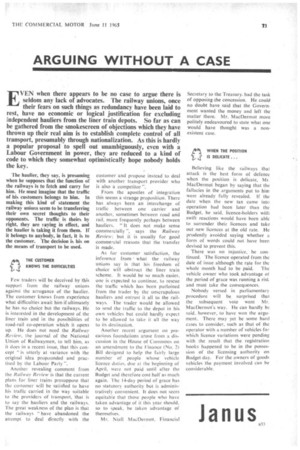ARGUING WITHOUT A CASE
Page 75

If you've noticed an error in this article please click here to report it so we can fix it.
EVEN when there appears to be no case to argue there is seldom any lack of advocates. The railway unions, once their fears on such things as redundancy have been laid to rest, have no economic or logical justification for excluding independent hauliers from the liner train depots. So far as can be gathered from the smokescreen of objections which they have thrown up their real aim is to establish complete control of all transport, presumably through nationalization. As this is hardly a popular proposal to spell out unambiguously, even with a Labour Government in power, they are reduced to a kind of code to which they somewhat optimistically hope nobody holds the key.
The haulier, they say, is presuming when he supposes that the function of the railways is to fetch and carry for him. He must imagine that the traffic of his customers belongs to him. In making this kind of statement the railway unions seem to be transferring their own secret thoughts to their opponents. The traffic is theirs by right, they are saying in effect, and the haulier is taking it from them. If it belongs to anybody, in fact, it is to the customer. The decision is his on the means of transport to be used.
THE CUSTOMER
ft44' KNOWS THE DIFFICULTIES Few traders will be deceived by this support from the railway unions against the arrogance of the haulier. The customer knows from experience what difficulties await him if ultimately he has no choice but the railways. He is interested in the development of the liner train and in the possibilities of road-rail co-operation which it opens up. He does not need the Railway Review, the journal of the National Union of Railwaymen, to tell him, as it does in a recent issue, that this concept "is utterly at variance with the original idea propounded and practised by the Labour Party ".
Another revealing comment from the Railway Review is that the current plans for liner trains presuppose that the customer will be satisfied to have his traffic carried in the way suitable to the providers of transport, That is to say the hauliers and the railways. The great weakness of the plan is that the railways "have abandoned the attempt to deal directly with the
customer and propose instead to deal with another transport provider who is also a competitor ".
From the apostles of integration this seems a stratige proposition. There has always been an interchange of traffic between one carrier and another, sometimes between road and rail, more frequently perhaps between hauliers. " It does not make sense commercially ", says the Railway Review; but it is usually for good commercial reasons that the transfer is made.
As for customer satisfaction, the inference from what the railway unions say is that his freedom of choice will obstruct the liner train scheme. It would be so much easier, one is expected to continue, to rescue the traffic which has been purloined from the trader by the unscrupulous hauliers and entrust it all to the railways. The trader would be allowed to send the traffic to the depot in his own vehicles but could hardly expect to be allowed to take it all the way to its destination.
Another recent argument on precarious foundations arose from a. discussion in the House of Commons on an amendment to the Finance (No. 2) Bill designed to help the fairly large number of people whose vehicle licence duties, due at the beginning of April, were not paid until after the Budget and therefore cost half as much again. The I4-day period of grace has no statutory authority but is administratively convenient. It does not seem equitable that those people who have taken advantage of it this year should, so to speak, be taken advantage of themselves,
Mr. Niall MacDermot, Financial Secretary to the Treasury, had the task of opposing. the concession. He could no doubt have said that the Government wanted the money and left the matter there. Mr. MaeDermot more politely endeavoured to state what one would have thought was a nonexistent case.
nWHEN THE POSITION IS DELICATE . .
Believing like the railways that attack is the best form of defence when the position is delicate, Mt. MacDermot began by saying that the fallacies in the arguments put to him were already fully revealed. If the date when the new tax came into operation had been later than the Budget, he said, licence-holders with swift reactions would have been able to surrender their licences and take Out new licences at the old rate. He prudently avoided saying whether a form of words could not have been devised to prevent this.
There was no injustice, he continued. The licence operated from the date of issue although the rate for the whole month had to be paid. The vehicle owner who took advantage ot the period of grace was running a risk and must take the consequences.
Nobody versed in parliamentary procedure will be surprised thal the subsequent vote went Mr. MacDermot's way. He can hardly be said, however, to have won the argument. There may yet be some hard cases to consider, such as that of the operator with a number of vehicles for which licence variations were pending with the result that the registration hooks happened to be in the possession of the licensing authority on Budget day. For the owners of goods vehicles the payment involved can be considerable.
Janus




























































































































